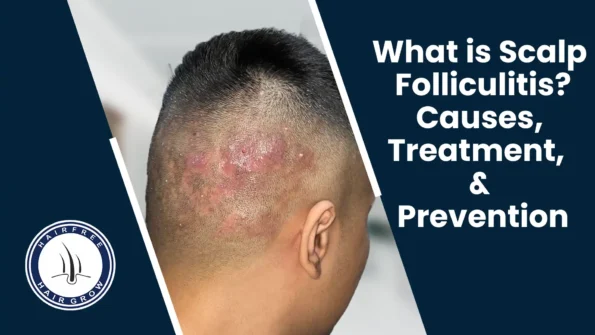Scalp Folliculitis is a skin condition where the hair follicles on the scalp become inflamed. This inflammation can be caused by a bacterial or fungal infection, leading to discomfort and irritation. In this blog, we’ll explore what scalp folliculitis is, its causes, treatment options, and how to prevent it.
What is Scalp Folliculitis?
Scalp Folliculitis is a condition where the hair follicles on your scalp become inflamed, often due to an infection caused by bacteria or fungi. This inflammation can lead to redness, pus-filled bumps, itching, and even pain in the affected areas. While it may sometimes resolve on its own, recurrent folliculitis can be persistent and troublesome.
Causes of Scalp Folliculitis
Bacterial Infection:
The most common cause of scalp folliculitis is a bacterial infection, particularly from Staphylococcus aureus. This bacteria can invade the hair follicles, leading to repeated inflammation.
Weakened Immune System:
If your immune system is compromised, your body may struggle to fight off infections, making you more prone to recurrent folliculitis.
Skin Conditions:
Conditions like acne, seborrheic dermatitis, or eczema can make the hair follicles more susceptible to infection.
Poor Hygiene:
Inadequate personal hygiene practices can increase the risk of bacterial or fungal infections, leading to folliculitis.
Other Factors:
Conditions such as diabetes or excessive sweating can also contribute to scalp folliculitis. Dirt and dust buildup on the scalp can worsen the condition.
Symptoms of Scalp Folliculitis
- Redness and Inflammation: The skin around the hair follicles may become red and swollen.
- Pus-filled Bumps: Small, pus-filled bumps or pimples may form on the scalp.
- Itching: The affected area can be itchy, causing discomfort.
- Pain: Some people may experience pain, especially when touching or combing their hair.
Proper diagnosis is essential to differentiate scalp folliculitis from other conditions like tinea capitis (scalp ringworm). Your dermatologist may perform a clinical examination and, in rare cases, a biopsy or culture to confirm the diagnosis.
Treatment Options for Scalp Folliculitis
Topical Antibiotics:
Applying antibiotic creams, lotions, or ointments can help reduce bacterial infection and inflammation in the affected follicles.
Oral Medications:
In more severe cases, oral antibiotics may be prescribed to eliminate the infection. It’s essential to complete the full course of antibiotics to ensure the infection is fully treated.
Skin Care and Hygiene:
Maintaining a gentle skincare routine with mild cleansers and exfoliants can help keep the hair follicles clean and free from bacteria.
Lifestyle Changes:
Regular exercise and proper hygiene practices can strengthen your immune system, reducing the chances of recurrent infections.
Prevention Tips for Scalp Folliculitis
Prevention is always better than cure. Here are some tips to help prevent scalp folliculitis:
- Maintain Cleanliness: Regularly clean your scalp and avoid excessive oiling. Washing your hair with natural ingredients like neem leaves, aloe vera gel, or shikakai and Areetha can help keep the scalp free from bacteria.
- Healthy Diet: A balanced diet rich in vitamins and minerals can strengthen your immune system.
- Personal Hygiene: Use your own towel, razor, and comb, and avoid sharing them with others.
- Consult a Dermatologist: Regular check-ups with a dermatologist can help keep your scalp healthy and prevent folliculitis from recurring.
By following these preventive measures and seeking proper treatment, you can keep your scalp healthy and free from folliculitis.
Final Words
Dealing with scalp folliculitis can be frustrating, but with the right care and attention, you can keep it under control. By understanding the causes, exploring treatment options, and following some simple preventive measures, you can keep your scalp healthy and free from irritation.
Taking care of your overall health is the foundation for achieving healthier hair. If you’re dealing with hair loss and looking for effective treatments, consider visiting HairFree and HairGrow Clinic today. Schedule a consultation and take the first step towards restoring both your hair and confidence with our top-tier hair transplant services.
Written By
MD (Skin & VD)
Dr. Richa Sanmukhani is a hair restoration expert specializing in scalp health. With extensive knowledge of What is Scalp Folliculitis, its causes, treatments, and prevention, she provides personalized care to help patients achieve healthier scalps and long-lasting hair growth.
Disclaimer
We’ve made all possible efforts to ensure that the information provided here is accurate, up-to-date and complete, however, it should not be treated as a substitute for professional medical advice, diagnosis or treatment. See Detailed Disclaimers Here.



